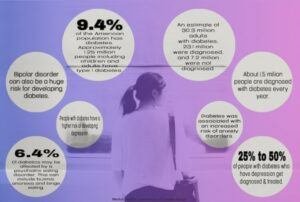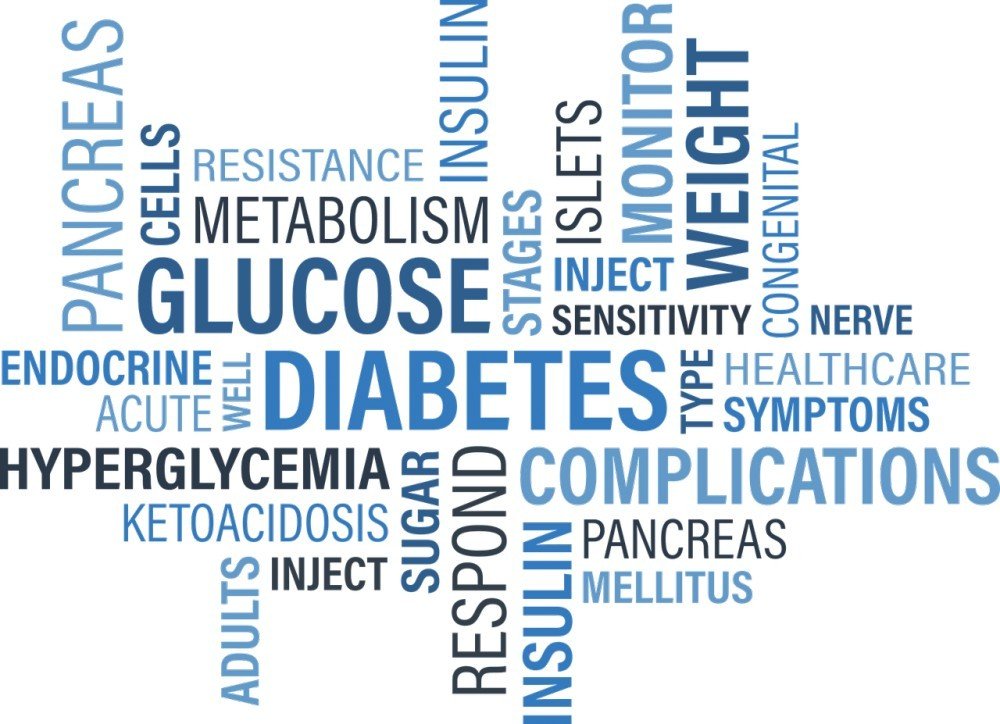Diabetes and mental health, not something you will normally think about when you have any of these illnesses. You may not even know it, but your diabetes, no matter if it’s type 1 or type 2, it can have a really big effect on your mental health, that could worsen both of your conditions.
I’m sure you’re wondering how does diabetes affect your mental health, and I’m here to help you understand a little more how this works
Please note, I am not a doctor. I have type 1 diabetes, and I also struggle with my mental health, so this will mostly be an informative article about my knowledge on these topics.
What Is Diabetes?
Diabetes can be defined by the lack of insulin your pancreas produces.
Insulin is a hormone that helps you manage the blood sugar in your body. Meaning that every time you eat any type of food, these foods contain sugars, and the insulin simply helps you manage that activity of eating and processing, so that the sugars and carbohydrates don’t spike up your blood sugar levels.
But what happens when your pancreas stops producing insulin?
Once your pancreas stops producing this hormone, your blood levels will start climbing up, to levels they’re not supposed to be at. A normal glucose range should be between 80-100 mg. Once the person starts seeing that their blood sugar goes up to 150 mg or even more, you should really talk with your doctor about this. If it goes over 200 mg that is an emergency and you should have some blood tests done to see how your pancreas and your blood, in general, is reacting to the way you’re eating and feeling.
There are two types of commonly known diabetes, which are: type 1 diabetes and type 2 diabetes
• Type 1: That’s when your pancreas completely stops producing insulin. Meaning that you will need generic insulin.
• Type 2: That’s when your pancreas still produces insulin, but not the necessary doses your body needs. Therefore, you will need to also take the medication your doctor prescribes in order for you to maintain your pancreas functioning and to prevent your blood sugar levels from spiking up.
Statistics
We all struggle to find balance, but it can sometimes be overwhelming and we don’t know what to do.
Here are some statistics to help you understand how does diabetes affect your mental health.

How Does It Affect You?
It’s finally time to discuss how these two very different conditions intertwine with each other, and how does diabetes affect your mental health.
I was diagnosed with type 1 diabetes about seventeen years ago. It has not been an easy path. In fact, it has been one of the most difficult things I’ve had to deal with. As I was growing up my world collapsed in so many ways, and so did my mental stability.
Depression came knocking on my door and I couldn’t keep the door shut, so she has stayed with me ever since.

What are the most common effects diabetes has on your mental health?
• When you’re depressed you don’t want to deal with absolutely anything. You feel numb. That leads to poor care of your diabetes. Meaning that you may not eat during the day, or you may eat but not even bother of taking your insulin dose; which can be a huge risk for your life.
• Diabetes can be time-consuming, so you don’t even bother on monitoring your glucose level, because what’s the point?
• Dealing with diabetes means that you need to be active. Exercising is a huge factor in keeping your blood sugar at a steady rate, but when you also have a mental illness, you’re not motivated to work out. Hence, you don’t even want to get out of your bed.
• Being diagnosed with diabetes also means that you need to have some blood tests done several times a year, and you will also need to make an appointment with an Endocrinologist. Dealing with social anxiety can be a huge barrier for you to actually attempt these appointments, which can be crucial if you don’t.
• Living with diabetes can also be a daily stress situation. You may overthink, and your concerns will overwhelm you, to the point that your blood sugar can actually spike up due to these things.
• People who struggle with diabetes can also have a high tendency of developing an anxiety disorder. Diabetes can lead to so many other complications such as heart problems, kidney failure, stomach conditions, brain failure and retinopathy (which is when the retina in your eye starts to fall out, meaning that the person can permanently become blind). That sounds scary, doesn’t it? For people with diabetes all of those things can be anxiety-inducing. Stressing and getting anxious, thinking of ways to help yourself, and prevent your condition to worsen.
As I said before, diabetes may cause a complicated acceptance of reality and health problems that can worsen the symptoms regarding your mental health. Your mental illness has a high tendency of leading to unhealthy lifestyle decisions, which can all lead to diabetes lifelong complications.
Do I…
Take a moment to retrospect on yourself and see if you can relate to any of these symptoms.
• Irritability
• Constant tiredness
• Unmotivated
• Wounds that take too much to heal
• Mood swings
• Blurry vision
• No matter how much water you drink, you still feel thirsty
• Doing normal every day things drains you way too much
• You’d rather not know than live with the constant reminder
• Feel guilty or have suicidal thoughts
• Avoiding friends and family, but also avoiding responsibilities and school
These are only some of the symptoms that include both diabetes and mental illness aspects. There are so many more, but if we keep talking about this it will probably never end.
Be Aware
Sometimes we may think that diabetes isn’t really that serious, but when do we know our mindsets are leaning towards that direction?
Do any of this apply to you?
• Is it really that serious?
• One more bite can’t hurt, right?
• I don’t have time for any of this
• I will deal with it later
• I’ll go to the doctor when I have time
• Are snacks really necessary?
• Maybe I can skip my insulin dose today and do it tomorrow. What could go wrong?
• If people with type 2 diabetes only take pills, maybe I can stop injecting myself
• People with type 1 diabetes have to inject themselves, I don’t, so what’s the point of taking medication?
• Eating this high sugar candy will probably don’t do anything, and if it does, I’ll deal with it later

It is extremely important to recognize these type of thoughts. Thoughts like this can be critical. Please keep in mind that you may run the risk of a crucial development of other complications if you don’t take care of yourself.
What Can I Do?
There is no magic cure for diabetes nor for mental health. Everything needs determination, knowledge and the will of wanting to get better. You also need to visit your doctor in order to start treating your condition. Though, there are some things that maybe you can do to keep your mind occupied. These things can go from calling a friend or a family member, taking a break from everything around you to give yourself time to unwind, listen to music, go on a walk (even if it’s hard for you to get out of the bed, think of it as a task that you need to accomplish, you’ll feel like you’ve achieved something which is an amazing feeling), among other relaxing and unraveling things.
Note: If you have any of the symptoms mentioned, but are not yet diagnosed with anything, please don’t come to conclusions of diagnosing yourself. You can’t be sure until the professional in the health industry run some tests and come to a conclusion. Though, if you’re feeling any of these, please contact your doctor.
I hope this article based on knowing how does diabetes affect your mental health, was somehow helpful, informative and hopefully it expanded your knowledge regarding these illnesses.
If you deal with any of these, know someone who does, or simply just want to ask something or share your experience ,please do in the comment section down below.
Stephanie, this is very helpful. I don’t have diabetes, but I have friends who do and i have always wondered if they couldn’t just just take some medication and it would go away. I notice that they have to eat on time and monitor their carb intake and get check ups. My cousin has to do regular exercise which he finds hard to keep the habit. Based on your article diabetes seems to affect physical and mental health and knowing about it is not for the sufferers alone. Everyone needs to know about it. Thank you for this information.
Sounds like a very dangerous combination. Thank you for sharing, I know this will help other people going through similar situations. I knew that mental health is very important, however with diabetes I am sure you have to be extra vigilant to make sure you are taking your medicine on time. I will make sure I direct any of my friends and family to this page if they have any questions!
Thank you for taking the time to read.
Hello
This article is very informative. When I was pregnant, I got diagnosed with Gestational Diabetes, and it was stressful having to prick my fingers and test my levels several times a day.
It was annoying to have to keep food journals and to make sure I was eating the right things. I wanted to ignore all of my doctors’ advice, but I didn’t. I can empathize with people who have to deal with this disease daily. How did you make peace with it? Or does the acceptance come with time?
It’s an every day learning experience. Sadly, my diabetes has worsen over the years, but I’m trying my best to manage it. Thank you for asking and reading!
This is really eye-opening and it also makes a lot of sense. I’ve been studying a lot about the brain since my mother died of dementia. It’s true that any imbalance in our hormones and even gut chemistry changes our mental functioning. I’ve had grandparents with type 2 diabetes who didn’t function normally when their blood sugar was high. It really impairs judgment and thinking. Do you have suggestions for supplements that can help with depression?
Thank you for taking the time to read. I am so sorry to hear about your mother, I really hope you’re managing. As to supplements, I can’t really say. I’m currently on prescribed medications so recommendation is to talk with a health professional.
I used to ignore this kind of information when I was younger thinking I’m invincible. But now that I am entering 40, I realized I should pay more attention to articles like this. Add to that, my grandmother died of the complications caused by Type 2 Diabetes so I really need to be careful not to contract the same illness when I get really old. One thing I’d like to ask with regard to this illness is that, does Diabetes damage our brain physically resulting to Dementia?
That I am not sure, but it’s a possibility. Diabetes can damage basically every organ on your body. I’m in my 20s and I already have heart and vision problems, so taking care of yourself is a big key to prevent complications.